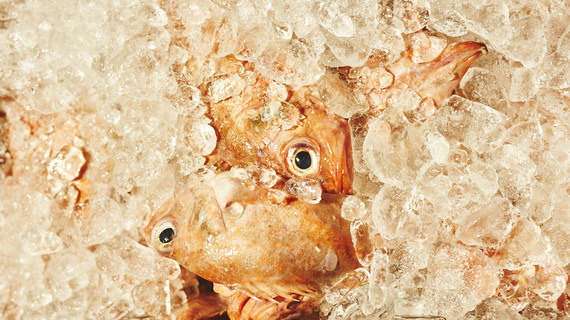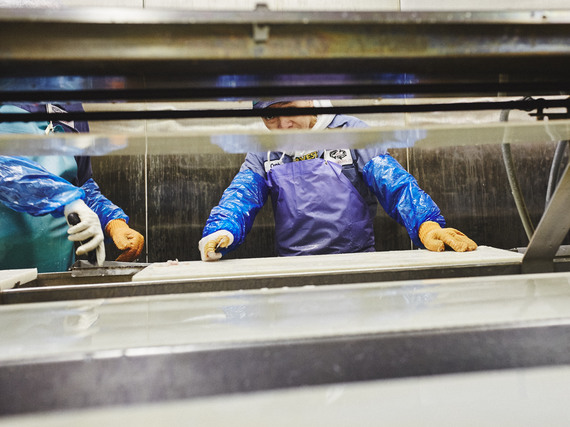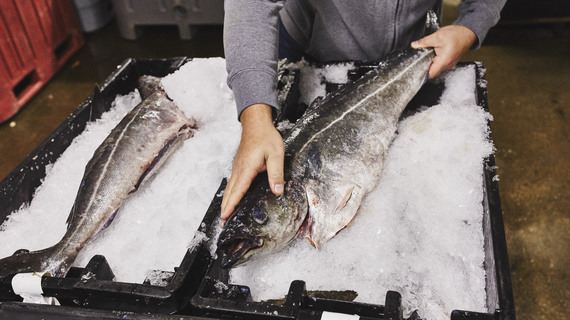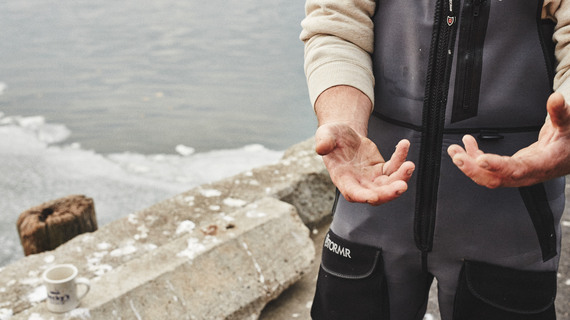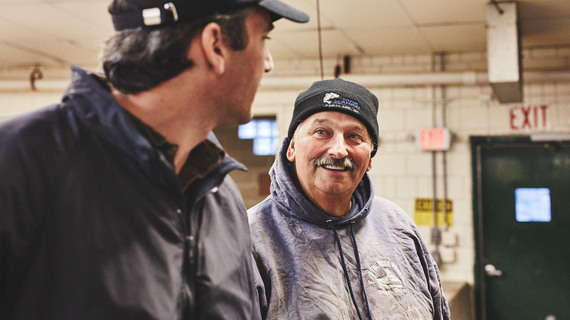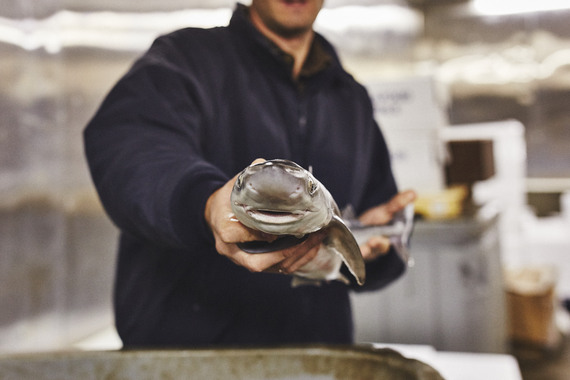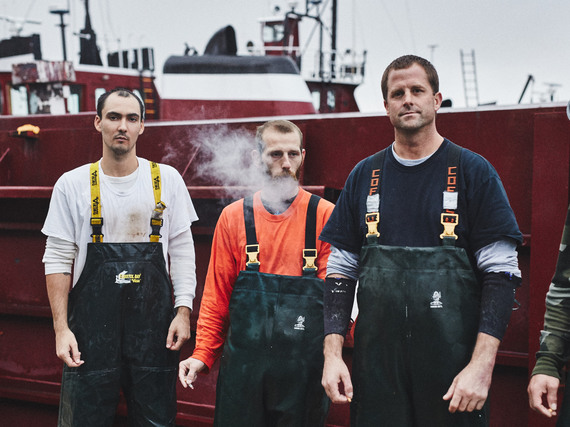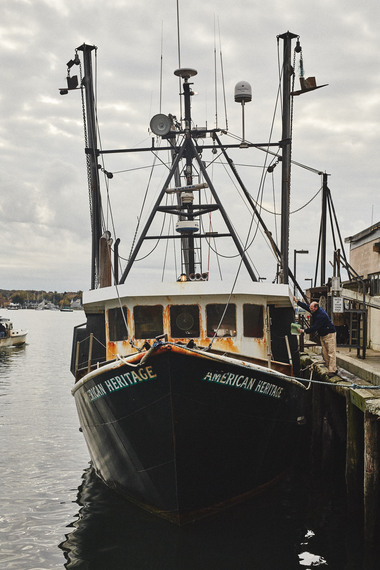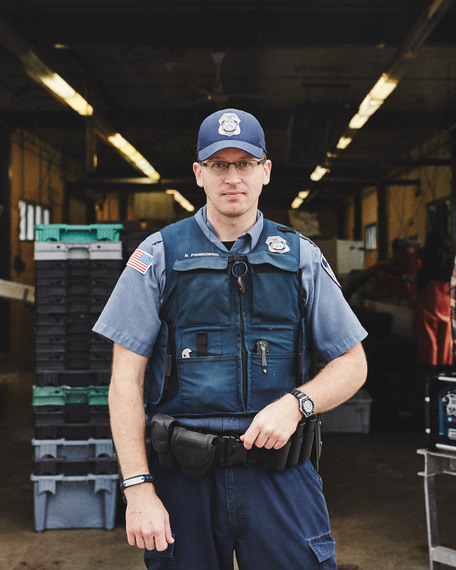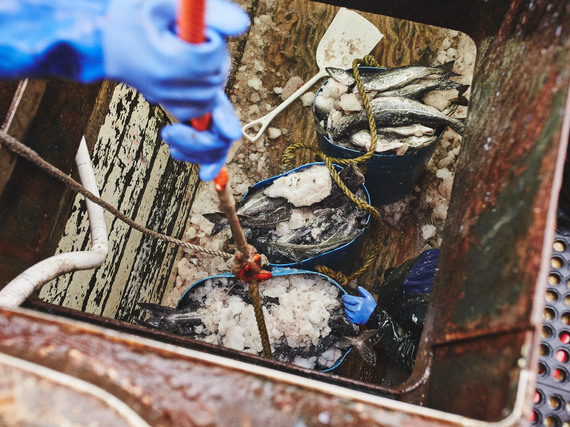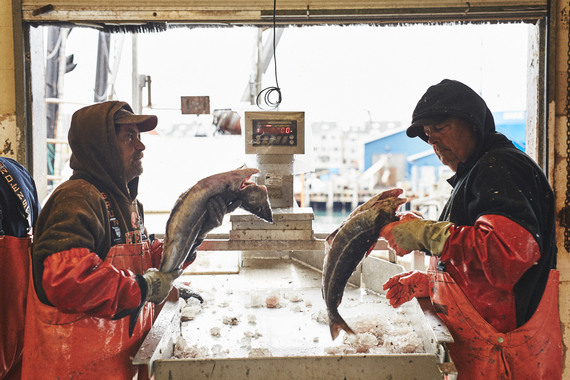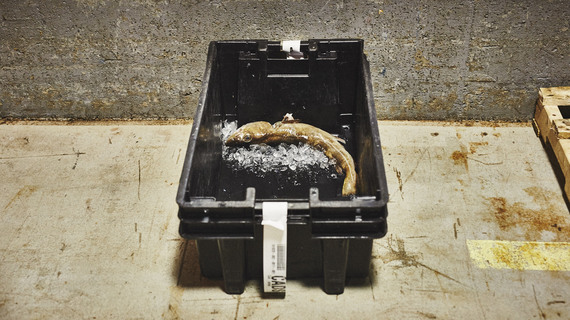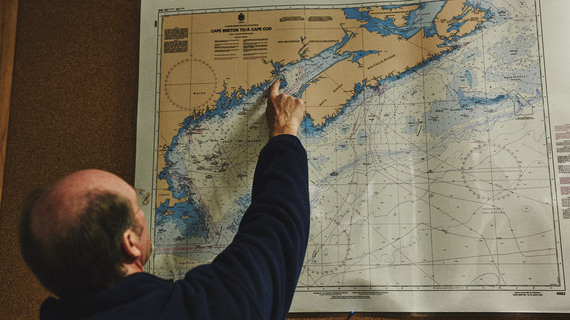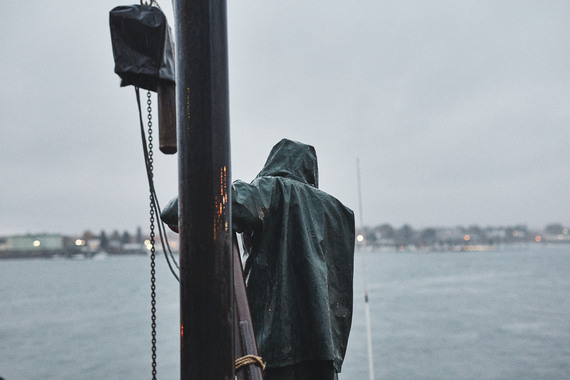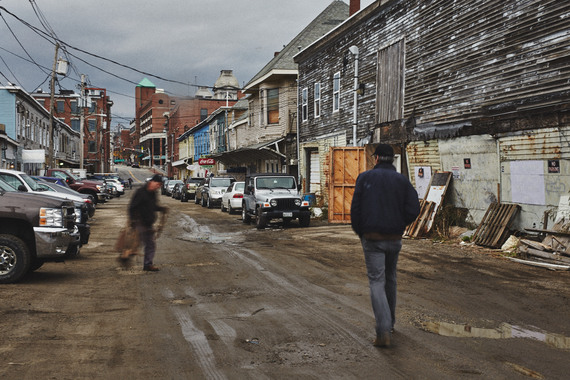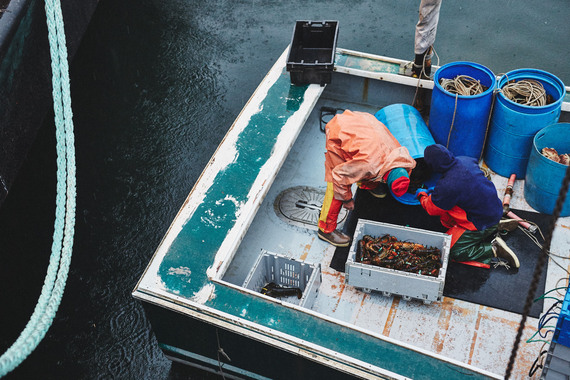
It's 6:30 AM outside Nova Seafood in Portland, Maine, and the sun is missing -- not unusual for an early morning in New England. The air has a bite, and is tinted blue from passing headlights colliding with the ocean fog. We're a small team this early morning, far from New York City -- just one writer, photographer, and videographer deep. The night before, we checked into a quirky floor of a Victorian mansion close to the docks, setting up camp for the next 36 hours in the historic fishing town. Robert, our photographer, rigs his camera on the back of a pickup truck for a group photo before we head in. We collectively squint back against the lens, hungover from a night trying to keep up at the billiards table with local fishermen.
By 6:33 AM, we're toe-deep in a pool of fish 'juice,' and wading through the small puddles of melted ice and gurry as we make our way to the haddock room. There, in an oversized freezer, the morning's first catch awaits the careful carving of the assembly line workers. Each piece is hand inspected as it's plucked from the conveyer belt.
"You have to know what to look for," Sean Dimin, co-founder of a sustainable seafood distributor called Sea to Table and our tour guide for the trip, tells us. He's at least 6'6'', and picks up a fresh catch with his bear-like paws, running his hands against the body. "You want the fish to be stiff, with its scales intact." He delivers an undercut jab. "You want clear eyes -- old fish have murky eyes. When you look into their eyes, they should shine back at you."
The sweatshirt-clad crew works tirelessly and precisely against each flesh. They carve unflinchingly into the muscle mass that rides the spine between the shoulder blades. The objective is always the same: maximize yield so you throw away as little of the body as possible. Each sweatshirted silhouette is outfitted in an apron, waterproof rubber boots and a hairnet.
There is a distinct rhythm to the slicing, but the formula is predictably patterned. The head and fins are discarded, and useable scraps are tossed into an oversized bin to be used for cat food. The filets are cleaned with water and dried via conveyer belt, before they are hand-packed into a Styrofoam box. A bone-chilling layer of shaved ice is added on top, before the box is swiftly sealed. The haddock and pollock processed here have been out of the Gulf of Maine for less than a few hours, and are already halfway through the agricultural chain of ending up on someone's dinner plate.
Outside of the fish cooler we meet Jack Lombard, a burly, sharp auction buyer who handles Atlantic (often Icelandic) sales and purchasing for Nova Seafood. He's the middleman between boat and buyer, the latter of whom are often middlemen themselves that expand the seafood industry out like an accordion. Jack grew up in Portland, though he left for college to study music at Berklee an hour and a half south in Boston. He now makes his livelihood as a distributor, but he can still pack a room for carols and classics come holiday time, hammering away at the keys while his friends and family croon along.
Many in Jack's generation, a now fully grown network of fisherman's sons and daughters, with kids and mortgages of their own, have left the increasingly gritty seafood industry. When Jack's father and other "old timers" ran the business, fishing was different. There were limited, if any, restrictions on what you could bring back on your boat. If you could catch it, and if there was a market for it, you could make a living. And maybe even a good one at that. But the seafood industry is no longer dictated by the wax and wane of supply and demand. What people want to eat and what people have to eat -- if we're going to continue to eat seafood -- are no longer one in the same. Many highly skilled, competent fishermen are now electricians because of that fact.
"Have you met Tommy?" Jack asks, scanning the concrete floors of the processing facility.
Tommy's an old-timer, by Jack's standards. He has a last name, but doesn't need one in Portland. Everyone knows who "Tommy The Dogfisherman" is. "He should be in from the dock by now. He's one of our best guys."
Tommy appears from an office tucked to the side in the processing warehouse. It's immediately clear why we're being introduced. He's the sort of fisherman that writers, as long as fishermen have existed, have devoured for material. An old school, larger-than-life belly and vibrato. Eyes that literally twinkle like the sea. That would be a cheap description if it weren't factually present when we photograph him. He's quick, jolly, and impressively entertaining. He would make a great St. Nicholas impersonator, should that role ever require an impossible-to-ignore New England accent.
Within 30 seconds of introductions, Tommy the dogfisherman is explaining to us exactly what is wrong with dogfish. "Change the name!" he yells -- though he's not yelling, only animated at full decibels.
Change the name -- check. I don't exactly have the authority to do so (who does?), but it seems like he thinks that I might, so I nod earnestly.
"Listen," Tommy presses, "I had 15 people over for dinner last week and told them I was makin' baked haddock. I'm going to give you my recipe. All you need is a good DRIZZAL of lemon juice, and season it with butter and GAHLIC. THEN, here's the kicker, you cover it in Ritz Crahkas and pop it in the oven at 350 degrees for twenty minutes."
Tommy, now chef-- slash-- fisherman, wasn't making haddock, of course, but dogfish, a type of small shark that is increasingly dominating the Portland seafood scene. It's a mild, meaty white fish and a voracious eater. Dogfish will feed on almost anything smaller than its own size, which often includes more commercially viable breeds like cod. Currently, there's a 23-1 ratio of dogfish to cod in these waters. In the UK, dogfish is a common catch for battered fish and chips. Here, it sells at auction for 15 cents per pound. Most fishermen throw them back overboard when they're caught as incidentals. It's simply not worth the effort and capital to process and hold them if they're not going to sell.
If the ocean is earth's last great frontier, fishermen have always been its cowboys. It might be less dusty, but it's no less daunting. To function in such a limitless space naturally has precipitated rules over the years, spoken and subliminal. These carry across generations like waves. There are rules on turf (This is still very much a thing, as we are semi-seriously accused of being Canadian spies on our trip by a charming lobsterman). But more pointedly, there are rules on hard work and what it means to take pride and ownership in your work. There are rules on forging community, both with the people on the boat and the catch beneath it. And there are also rules for sustaining longevity and accountability in your field.
These etchings are carved deep into modern Portland, which, despite its cosmopolitan amenities and charming, tourist-friendly facade, is a deeply habitual, and even gritty New England fishing town, head to fin. This means that to get hired on a stern site for the season, you might post your "resume" the way you would 50 years ago, on a Post-It note in the captain's room of the fish auction house, listing your geographical birthplace (like Newhaven, an island off Maine's coast) much the way you would a college degree or proficiency on LinkedIn.
Some things won't change in Portland, but a lot already has. The sea is one of the last stretches of earth to be systemically bridled. And it couldn't come at a more pressing time.
American Heritage Boat #674546 has just arrived to the dock, and Jack and Sean and our team head out from the processing facility to watch the unloading.
While we're careening under ropes and sidestepping baseboards to get to the boat, I ask Jack for a working definition of sustainability. He pauses. "It's taking a population out that doesn't affect the population of the entire ecosystem. Buyers, stores, states and fisherman will have different definitions of what it means to be sustainable. Sometimes they are self-serving."
Technically, it doesn't exactly matter whose definition is purer, because one voice ultimately trumps the others. Today, he's camped out in the corner of the processing warehouse as seventies rock hits blare from the speakers and flannel-clad workers weigh and sort each fish coming from the boat by species and size. He's unassuming, if a bit uneventful. Glasses. A kind face. The letters NOAA are sewn into his uniform, not dissimilar to the iron-on scout badges from childhood camps. National Oceanic and Atmospheric Administration, it reads. Department of Commerce.
The NOAA officer is the metaphorical sheriff of the harbor. His job is simple: to make sure that the fish coming off the American Heritage are within set catch metrics established by the state. The day's harvest is brought out from the fish hole on the boat species by species, loaded into oversized plastic blue bins and hoisted from a pulley system into the warehouse. They tumble down a steel assembly-line funnel, with ice chunks flying into the air as fish break apart and their chilled bodies audibly smack into a loading zone.
They're swiftly manhandled by two burly workers, weighed, sorted and stacked into crates to be brought to "auction" in the next room. The American Heritage came in with around 15,000 pounds today. Acadian red fish, haddock, pollock and yes, many, many dogfish-- they're all here.
What's noticeably missing, a name that has dominated the pallet of Americans for the last, say, 400 years, can be found in one solitary bin in the auction room, represented today as one solitary fish. To be a cod is to live a lonely, post-life life in the New England auction room these days.
Water temperatures in the Gulf of Maine have hit record highs for five years in a row now. Cod has always been at the southern end of their territory as is, so when their dwindling population is considered in light of years spent overfishing and rising water temps, it's no wonder this once plentiful stock has sought refuge elsewhere, or just downright disappeared.
Still, if you've been to a premium fish market or upscale grocery store in the last year, this might seem unexpected. Fresh "Atlantic cod" is a familiar beat for fish lovers. But the Atlantic is a big place. Norway has sustainable Atlantic Cod. So does Iceland. And well-meaning people see these names at Whole Foods and think they're supporting domestic fishing communities, much like Portland. And that's not to harp on Iceland cod. Icelandic cod is great. In Iceland.
But what we're actually doing when we import all of our fish in and ship what we catch oversees based on popular demand (like dogfish to England) is to strengthen the disconnect between fisherman and the lay eater, and to encourage, at best, overly idealistic and potentially nihilistic practices that harm our ecosystem and economies. Shortening the supply chain and reducing public desire to shop internationally for our seafood is the best method for preserving integrity within our fishing communities, to put value back into the pockets of both fisherman and consumer, and to also ensure that we swim with the current as far as our diets are concerned, and not against them.
Andy's Old Port Pub is a local watering hole a short walk from the Portland sea yard with the only pie you'll ever need: a wild Maine blueberry. "Every piece is going to have its own personality," the owner tells us as she sets down four generous slices. "Some days the blueberries are a bit tart and punchy. On others, they're sweet." "Kind of like all of us," I offered. We dive headfirst, against the drumming of rain fogging up the oversized street front windows. The pies are shockingly perfect. And that's coming from a Midwesterner. But Andy's, as you might expect, also has some of the freshest fish in town, which still sounds appetizing even after hours of smelling, sopping in and probably sweating local seafood.
"What's the catch in your fish and chips?" Sean asks from across the bar, knocking back a beer in a swift gulp.
"Pollock." It's delivered swiftly and confidently from the bartender. "We get it from across the street."
What's remarkable about this moment is not that a bar in Portland, Maine is serving local, sustainable seafood that was caught within the past 24 hours. This is perfectly orchestrated small fishing town harmony at its best.
What is remarkable is that if we continue to snip at the chains in the ore separating the fisherman from the consumer and work within, instead of against environmental constraints, we can do something for most non-coastal Americans that has been out of the picture for some time: delivering sustainably-caught, domestic seafood, frozen and shipped straight from the sea that's as good as what I enjoyed at that bar counter. That means less time spent deciphering a fish label at an expensive market for quality, value and freshness. That means reinstating value for both fishermen and consumers, without burdening our oceans. That's revolutionary.
Fisherman care as much about where their fish are going as people care about where their seafood is coming from. When we choose to privilege this connection, the ocean will again be an inexhaustible source of sustenance and livelihood, as it always has been.
All photographs shot by Robert Bredvad. Amy is a freelance writer in New York. To learn more about her current projects, visit her website.
